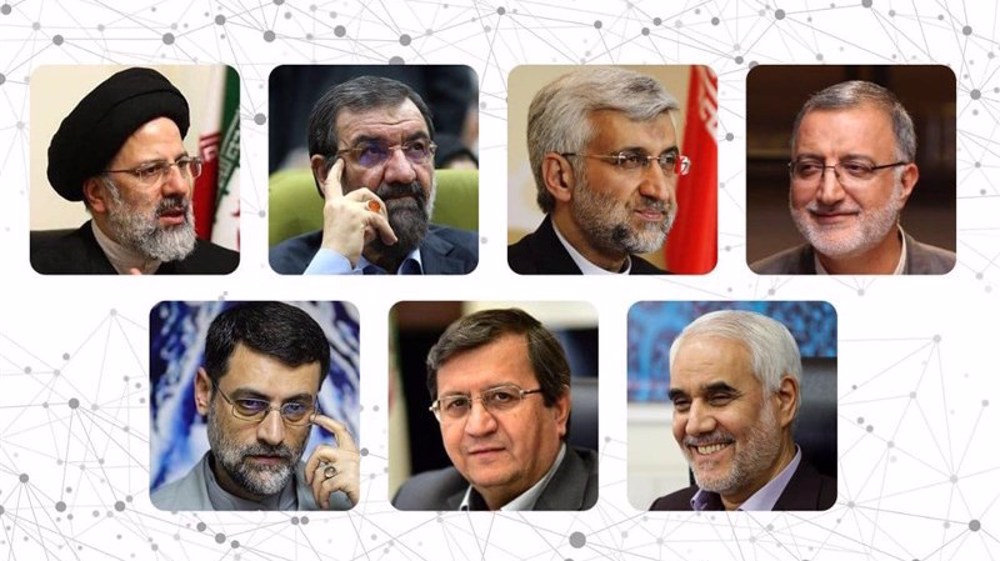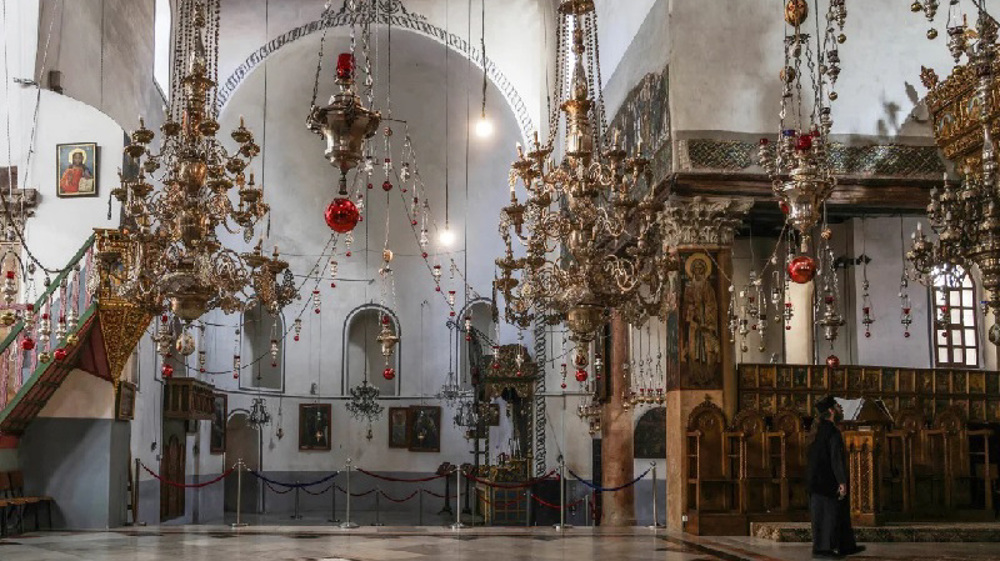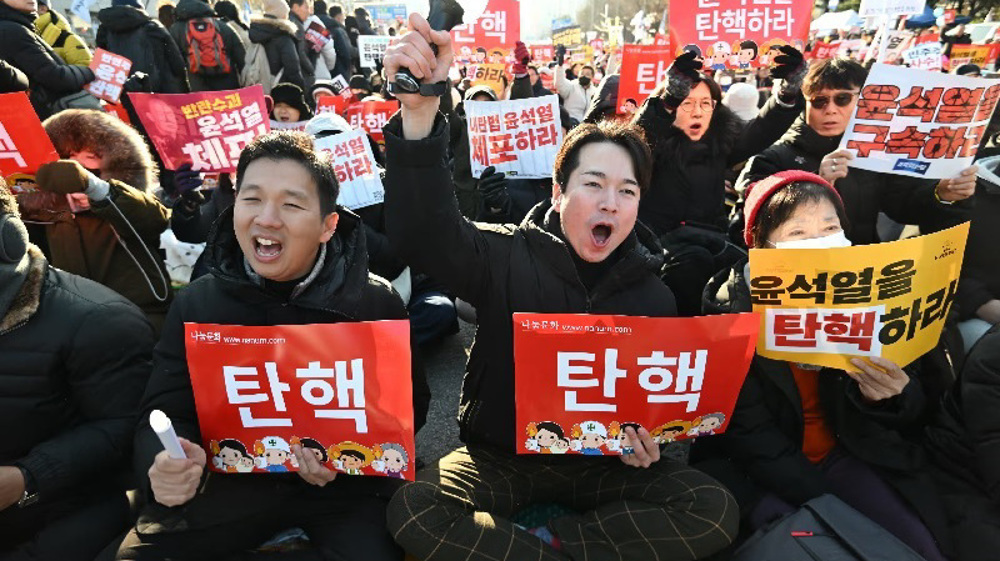Diversity among candidates in upcoming presidential election
It takes less than a month to put a new face to the country. Prospective presidential candidates had from May the 11th to May 16th to register with the Interior Ministry for the June 18th presidential elections.
Today, we’ll be taking a look at procedures filling the gap; vetting the hopefuls, their election campaigns, where they come from and which institutions have the clout to direct all the above into an acceptable future.
Presidential elections are held in Iran once every four years.
The general process is such that candidates register with the Interior Ministry, within a 5-day time-frame.
Their eligibility is then reviewed within 10 days by the vetting body known as the Constitutional Council, which has 12 members; six legal jurists and six experts in Islamic law.
Any candidate winning at least 7 votes is approved. Approved names are sent to the Interior Ministry.
Candidates can campaign from the day names are finalized till 24 hours before Election Day.
The election is then held in one day, with results announced the following day.
This year 592 people registered for the presidential race, after 10 days of vetting and consultations, the Constitutional Council announced the approved candidates on May 25th as follows:
- Seyyed Ebrahim Raeisi
- Mohsen Rezaei
- Mohsen Mehr-Alizadeh
- Saeed Jalili
- Alireza Zakani
- Abdolnasser Hemmati
- Seyyed Amir-Hossein Ghazizadeh-Hashemi
Now, these candidates have 20 days to campaign for the presidential seat.
We have always witnessed high voter turnout in Iran. Women and men take part in determining their future and destiny through elections.
This is the strength of the Islamic Republic of Iran.
But we have been facing a propaganda war against our country for the past several years now; which is part of the war the waged against Iran; an economic war and a propaganda war.
Our country has been facing fake news, a lot of slandering against the government.
Masoumeh Ebtekar, vice president for women and family affairs
Given the ongoing JCPOA-revival talks, one may expect a Reformist hopeful to win the seat of president.
Although people may be ready for a change of scene and elect a Principlist.
But in Iran election results have traditionally swung in favor of the dark horse or shadow candidate in the last few days running up to the election.
The events of 1997 showed us that when everybody believed Mr. Nateq Nouri would win the ballots and that it wouldn’t make a difference whether to vote or not. But we saw that it didn’t happen. The candidate that garnered people’s votes, Mr. Khatami, won the election with 20 million ballots, against his rival with 7 million votes.
Mr. Nateq Nouri also congratulated Mr. Khatami on his victory.
We have had this experience, and it can certainly happen again too.
Gholamreza Mesbahi Moghadam, Iran's Expediency Discernment Council
Having mentioned JCPOA considerations with the turnout and vote, it’s worth mentioning that the nuclear deal is not Iran’s only foreign policy factor, for it to be a total determinant.
There’s the 25-year China deal Iran struck, with the JCPOA’s failure to deliver any benefits. And this country is aware of a very partially-exploited, several hundred million-strong, regional market.
The Principlists are in luck. This is the reality. There’s a tendency toward Principlists in the society because Reformists and Moderates can’t be accountable for Mr. Rouhani’s performance.
Even Reformist figures like Mr. Aref tried to depict Mr. Rouhani as a placeholder president who isn’t a Reformist.
They’re right, of course, because we’ve known Mr. Rouhani and he hasn’t had a Reformist background.
But anyway, the cabinet has been the cabinet of the reformists. All reformist ministers were in this cabinet.
That’s why Principlists are now critical of the two past cabinets and hold people accountable who call themselves reformists.
Hossein Naghavi, Former Member of Parliament
Serious presidential candidates tend to formally register their candidacy a few hours prior to the deadline, for a position that will see them preside over the highest strategic decision-making body, the Supreme National Security Council.
The constitutionally mandated composition of the Council awards a seat at the table to each institution of the state; the Judiciary, the Legislative as well as the Executive branches.
Strategic cabinet ministers, and the Leader of the Islamic Revolution, or his representative, also each have a vote.
The president, as chief of the executive branch, governs how things are done to manage and steer the country.
Leader of the Islamic Revolution Ayatollah Seyyed Ali Khamenei believes in an evolving government which welcomes change. What would such a government look like?
The Leader of Iran’s Islamic Revolution has always emphasized people’s participation, presence, role, criticism, and protests. It’s important to note that his view is that people must have a permanent and active presence. His second view is that there should always be a change, there has to be a turnover in the country’s elites; that we shouldn’t repeat the past. This is something to be noted. If the elections are held and the same people with a different form win, the same people who’ve been in office for the past 40 years, we can’t expect any change to come about. People are looking for a government that would bring about profound changes.
Hossein Naghavi, former member of parliament
More than 59 million of Iran’s roughly 85 million population are eligible to vote, around 1.5 million of whom are first-time voters.
People may vote either way for economic reform; for a Reformist with a greater tendency for diplomacy and international relations, or a Principlist who can provide cover for Reformists to come to terms with the US and its Western partners over the JCPOA and sanctions lifting.
That is drawing on accounts by analysts abroad. Although looking at it from an Iranian standpoint, the system is pretty unified on wanting talks to yield results, without again giving a mile to take an inch.
The third scenario is that the turnout will be too low for Reformists to stand a chance, considering last year’s parliamentary elections when it fell to 42%, a record low.
There has been a face-off between the Constitutional Council and the Presidency over candidacy vetting criteria.
The new approval criteria have been ratified by 200 Iranian parliamentarians.
President Rouhani, however, instructed the Interior Ministry to ignore the Council Council proclamation because he believes the Council has no legal authority to impose new, more restrictive qualifying criteria on candidates.
But the Council said it would refuse to consider candidates as formally registered if they fail to provide all required documents, including a clean criminal record and no history of dissent.
Although candidates like to stress that they are independent, there are political currents in the background, which they’re either akin to, or which back the candidates.
The main currents participating in this year’s elections include the current critics of the [Rouhani] administration; the current aligned with the government; and the current supportive of the Rouhani government (Reformists). There are also independent candidates running for office.
In a religious democracy, the people’s votes are really influential and decisive.
You’ve witnessed in the past elections, for example, that the whole electoral system was being managed and administered by a political faction, but someone from a rival party won the election.
For instance, in 1997, everyone knew that all electoral executive bodies were in favor of Mr. Nateq Nouri, but the people voted for Mr. Khatami and he won.
These are very important in a religious democracy.
Another example was in 2005 when all the administrative bodies were supportive of Mr. Hashemi Rafsanjani, but people voted for Mr. Ahmadinejad. The same happened in 2013. This is a matter of pride.
Hossein Naghavi, former member of parliament
In a working democracy, it is important for the electoral system to run on the basis of political parties. Iran has hundreds of parties but how practical and functional they are is another matter.
The fact that the person is elected, but doesn’t make good on his words afterward goes back to the problem of not being bound to parties, because the candidate hasn’t been backed by a party, which can be held accountable after winning the vote.
The US Democrats are accountable for the President’s performance because it was the party that collected the votes. The president has won as a Democrat.
But because the principle of parties hasn’t been established well in Iran, the candidate feels free to do whatever he wants after taking office as president. It’s because there’s no party to admonish him.
Hossein Naghavi, Former Member of Parliament
Official figures show 92 candidates including 40 women had registered by the May 19th deadline.
What gave those 40 women the confidence to apply as prospective presidential candidates this year?
This is the culmination of a series of policies that we implemented that has been successful in terms of engaging women in the decision making processes in the country.
We started at the beginning of this administration 8 years ago; about 5 percent of the managers in the government of the Islamic Republic (at the time) were women. Although it is stipulated in the Constitution that there is no obstacle to women’s engagement in politics; the Leader and Imam Khomeini, neither has issued any barrier against women’s engagement in politics and running the affairs of the country.
But president Rouhani in fact put forward a strategy particularly from 2017; he set a quota that 30 percent of managers appointed in this administration have to be women.
Masoumeh Ebtekar, vice president for women and family Affairs
What tends to happen in Iran is that weaker positioned candidates on each front pull aside, in favor of the winning card closer to their camp. …
It’s important that candidates from the two rival political camps compete, even if it doesn’t result in polarity of votes. But people have to be able to prefer one over the other. There has to be a meaningful ground for preference.
We can say one of the candidates is good, but the other is better.
Or I can remember there was a time that we said one of the candidates was bad, but the other was worse, so we need to do something so he wouldn’t take over.
What I believe is crucial, is that people understand that our current economic and social situation isn’t acceptable at all. Especially over the past 8 years, things haven’t been improving but even regressing.
Of course, both domestic and foreign factors were involved, but proper management makes a difference.
Gholamreza Mesbahi Moghadam, member, Iran's Expediency Council
To what extent would you say the political factions in Iran have reached political maturity?
Certainly, political movements have gained the necessary maturity after some 40 years of activity in Iran. There are some occasions when they face problems and doubts. But it’s not because they’re not mature enough, there are other reasons for that. The main one is the lack of parties. We don’t have large and relatively inclusive parties. They’re too small.
Gholamreza Mesbahi Moghadam, member, Iran's Expediency Council
Article 26 of the Constitution of Iran stipulates that the formation of “parties, societies, political or professional associations, as well as religious societies, …is permitted, provided they do not violate the principles of independence, freedom, national unity, the criteria of Islam, or the basis of the Islamic Republic.”
In the early years following the 1979 Revolution, political parties were divided into right wing and left wing in the economic sense.
Most parties today can be classed as Principlists or Reformist.
These are 1990s adaptations of Right-wing and Left-wing. Then there are the Moderates (the incumbent Rouhani Government) and Independents.
Ideology or political agenda
Principlists say politics and religion are inseparable.
They support a minimized government role in the economy, to the extent mentioned in the Constitution. They view the globalization of the economy with skepticism, while putting special emphasis on retaining independence from foreign countries.
Reformists on the other hand, seek to execute the constitutional rights of the people and work toward enhancing political freedom. They opt for a promotion of interaction with the international community.
The term “Moderates” surfaced in 2013, with Hassan Rouhani’s presidential election campaign.
Moderates are widely believed to be left-leaning. They advocate employing diplomacy, and refraining from using harsh rhetoric.
The other end of the spectrum are reformists who believe in the principles of the Islamic Revolution, abide to the constitution but are very forward looking in their policies and believe that we have to have a progressive approach when dealing with Islam because it is a religion for all times and we have to engage in dialogues; we should be constructive but also can be critical dialog with our young generation to enable them to engage with the theoretical dimensions of the Islamic Revolution and to engage with some of the practical dimensions of what has happened during all these years. The Reformists believe in constant reforms of laws, policies, practices so that we can preserve the principles and the spirit of Islamic revolution.
Masoumeh Ebtekar, vice president for women and family Affairs
A spectrum of political party colors is no accident. Iran calls for diversity among candidates in the upcoming presidential election. But given this is a religious democracy, in contrast to a Western liberal democracy with no title, one wonders [again] if that actually means all walks of life in Iran will be covered by varied candidates and political parties.
It’s always been like this; I mean during elections in Iran we’ve always had candidates from the two major political camps, the Reformists and Principlists. It would certainly be the case in the upcoming vote too.
Gholamreza Mesbahi Moghadam, Member, Iran's Expediency Discernment Council
How do political factions in post-Revolution Iran compare to those prior the 1979 Revolution?
Political parties that were active before the revolution were Shah’s puppets. We used to have the Iran Novin Party and the People’s Party. The Shah dissolved both and formed the Rastakhiz Party and called it the single party, saying to anyone who’d oppose it to take their passport, obtain the visa for another country and leave. There were no independent parties that relied on the people before the victory of Iran’s Islamic Revolution.
Gholamreza Mesbahi Moghadam, Member, Iran's Expediency Discernment Council
It’s not just the thirteenth presidential elections the country will be holding on June 18, but the sixth election for the city and village councils as well as mid-term elections for the Islamic Consultative Assembly or parliament. Also the Assembly of Experts elections will be held on the same day in some provinces.
Western political pundits, the media and politicians, are always criticizing this country for not being a democracy in their eyes… but nobody is saying anything about authoritarian Arab kingdoms in the region.
Why they can’t see a commonality between religious democracy and Western liberal democracy bears consideration.
Because they don’t see (it as being) in their interest, the independence and the strength of the Islamic republic, because if the Islamic Republic of Iran proceeds as a successful model of an Islamic democracy in today’s world, they will have problems with many entities in the region, which are more or less dependent on western governments for their economy and political system.
They don’t like to see a successful model of an independent state emerging.
Masoumeh Ebtekar, vice president for women and family affairs
VIDEO | Palestinian childhood under threat
Yemeni forces strike Israeli military site with hypersonic missile
Yemeni missiles alter US, Israel’s calculations: Iranian FM
Israel provides full support for theft of aid to starve Gazans: Report
'Israel booby-trapped walkie-talkies, pagers years before Lebanon blasts'
Gaza Health Ministry calls for urgent intl. help to protect hospitals amid Israeli genocide
Stakes involved in Iran’s partnership with Eurasian Union
VIDEO | Press TV's news headlines
















 This makes it easy to access the Press TV website
This makes it easy to access the Press TV website